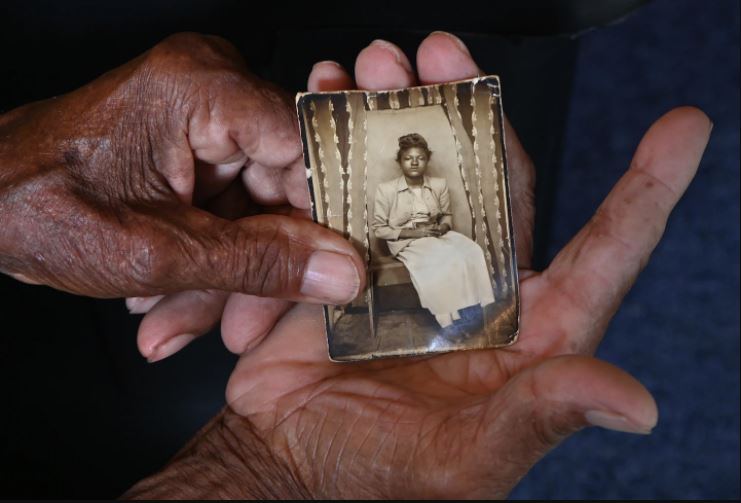Heir’s Property and FEMA Relief
Another example of structural racism.

Hannah Dreier reports for WaPo on “Why FEMA is denying disaster aid to Black families that have lived for generations in the Deep South.” The answer isn’t, as one might assume, “racism.” Or, at least, not as we’ve traditionally understood that concept.
Not enough people were signing up for help after a series of tornadoes ripped through rural Alabama, so the government sent Chris Baker to figure out why.
[…]
Baker was new to the agency, and this was his second deployment to a disaster zone. His supervisors had asked him to spread the word that people who lost homes to the March 25 tornadoes still had time to apply for grants of up to $72,000. But as he canvassed the area, a different message was spreading much faster: That people here were in fact not eligible for anything, because of how they had inherited their land. Because of the way Black people have always inherited land in Hale County.
More than a third of Black-owned land in the South is passed down informally, rather than through deeds and wills, according to land use experts. It’s a custom that dates to the Jim Crow era, when Black people were excluded from the Southern legal system. When land is handed down like this, it becomes heirs’ property, a form of ownership in which families hold property collectively, without clear title.
People believed this protected their land, but the Department of Agriculture has found that heirs’ property is “the leading cause of Black involuntary land loss.” Without formal deeds, families are cut off from federal loans and grants, including from FEMA, which requires that disaster survivors prove they own their property before they can get help rebuilding.
Situations like this are precisely what proponents of critical race theory mean when they speak of “structural racism.” Nobody at FEMA is in any way discriminating against Black people here; indeed, they’re expending extra effort to figure out why Black victims of natural disasters aren’t getting the aid they’re entitled to. But, quite reasonably, the fraud protection bureaucracy insists that people, regardless of race or ethnicity, demonstrate title to the property they’re seeking reimbursement to repair or replace.
Even in Hale County, Alabama—part of the so-called Black Belt—Black citizens have for decades been entitled to own property and have that fact recorded in the same legal system that white citizens use. But, within living memory, that was not the case. And that creates a Catch-22: if there was no record of property ownership from the days when Blacks were excluded, Black owners of the property have no records to prove that they are in fact the owners and to then pass title legally. Moreover, because collective ownership by the family rather than a particular individual or couple has been the norm for as long as anyone can remember—and nobody is trying to take the land away from them or otherwise deny them normal use of the property—most of these folks don’t even realize that they have a problem until it’s too late.
Some more backstory:
The ground they were standing on, like so much Southern land, had been purchased by a Black family during Reconstruction, a time when a generation of Black workers saved up and bought every plot they could, no matter how barren and unpromising. Within a few decades, a new class of landowners emerged: By 1910, Black people made up 10 percent of the U.S. population but 14 percent of its farmers. In Hale County, more than a quarter of farmland was Black-owned.
It was a short-lived era of prosperity, however, as Black landowners began buckling under what the USDA describes as a “well-documented” system of discrimination, including exclusion from loans and swindles by officials. Bands of poor White farmers threatened to murder Black landowners if they didn’t flee. Historians believe that many lynchings from this time, including hundreds in Alabama, were carried out to take Black property. By the end of the 20th century, the share of Black-owned farmland in Hale County had fallen to just 3 percent, including the plot on the hill, where the only sounds were the wind and a smoke alarm chirping somewhere.
And, on a more personal note:
“We have to prove that you own the house,” the grandniece explained.
“It ain’t in my name; it’s in my granddaddy’s name,” Albert said. “My daddy and them never did change it over.” Just before he died, Albert’s grandfather had warned the family never to let a White man take their land. Albert believed that by keeping the plot as heir’s property, he had minded his grandfather’s words. “A lot of folks been trying to buy the land. Trying to take it. But they won’t get it as long as I’m living,” he said.
While I must confess to having been blissfully unaware of this issue, it’s not new to FEMA:
The question of what happens to heirs’ property after a disaster is not unique to rural Alabama. FEMA has been grappling with the issue since at least 2005, when 20,000 heirs’ property owners were denied federal help after Hurricane Katrina, according to a USDA report. It came up again in 2017, when Hurricane Maria hit Puerto Rico. That time, FEMA denied more than 80,000 applications because of title problems.
There is no legal basis for requiring disaster survivors to provide incontrovertible proof of homeownership. FEMA created that requirement on its own, to combat scammers who make off with as much as 1 percent of aid each year. In 2018, under pressure to resolve the crisis in Puerto Rico, the agency created a process for people to self-certify homeownership.
But the fix applied only to islands and tribal areas, and it was not extended to the Deep South, where in internal correspondence, FEMA has recognized heirs’ property as “a perennial issue.” A FEMA spokesperson said the agency still requires most disaster survivors to prove ownership because “land ownership is recorded as a standard practice” in all of the continental United States and “self-certification of ownership increases the agency’s vulnerability” to fraud and improper payments.
Again, I’m sympathetic to the agency position. Americans are averse to giving taxpayer money away to those who don’t “deserve” it simply taking people’s word that they own the property opens up the risk of fraud. But, given that this is a well-known problem and a longstanding practice that people were forced to adopt during a time when Black people were denied their civil rights, one would think that a verification process relying on community testimony could be implemented to deal with emergency relief. And, of course, Hale County and other places where “heir’s property” is a widespread phenomenon should expend the effort to create proper documentation to end the problem.






Here in Charleston, the Post and Courier has done a lot of reporting on this issue. Another problem is that multiple family members may claim to own a share of the property – one family they highlighted had 40 family members staking a claim with some wanting to sell, some wanting to develop and some wanting to leave the land as it is. Ownership can be impossible to determine.
I, too, have never heard of this problem. But, wow. I am trying to imagine the dynamics of one family member trying to establish ownership when there are siblings, cousins and second cousins who might feel some entitlement. I would be curious to know the customs to establish which heir is the owner and how disputes among potential heirs are handled. But I can imagine how disruptive it would be to simply “create a program” where all the land is required to be titled in the next 5 years or something.
It’s also interesting to me that FEMA can identify this as a perennial problem and yet it’s spokesman can say:
This reminds me of the thread a while back about the circumstances of voting in very rural areas. People can live in one circumstance and just ignore the fact that it is simply not a universal circumstance.
ETA beth‘s comment demonstrates my point.
They won’t, and I’d wager lunch that any effort to do so will run into a wall of opposition and attempts to seize the land. It will be amazing, how many old loan default documents will turn up.
This is an excellent example of the long-term, deep problems created over time by racist processes and that do not require an active racist person in 2021 to perpetuate.
To emphasize this line from the piece:
So, the Jim Crow era wasn’t that long ago (ending formally in the mid-1960s, but it isn’t like a switch was flipped by the Civil Rights Act of 1964). That is simply not that long ago–someone in their 70s or 80s (and certainly younger) could be in this predicament due to what happened decades ago.
Plus, these are very poor areas of the state with lousy education levels and hardly a culture of understanding about how things like probate processes should work (and no collective family or friend-based memories to help one learn since everyone is in the same boat).
So, a disaster happens well into the 21st century and families and individuals end up suffering in the now for injustices that were perpetrated decades and decades ago.
Meanwhile, white families that had access to the legal system in the 1950s, for example, gets their aid when the tornado takes out their house.
(And people saying: “they should have known, so its their own fault” just isn’t the right response).
@Steven L. Taylor:
You know, we have more than a few congresspeople currently whinging about Critical Race Theory who are trained in the law. Wouldn’t it be a good thing if we could compel them to go to Alabama and do some pro bono legal work in the probate courts getting these Black families properly set up? It would definitely be win-win.
Big +1’s to all the points raised. I just have two more comments to make:
This situation provides a really important example of why a well-created social safety net program cannot strive for 0% fraud. In most cases those efforts tend to exclude far more deserving people than cut down on actual waste, fraud, and abuse (if for no other reason than the people who are likely to create the greatest amount for fraud usually are well versed in navigating that type of white-collar crime).
Or, if you are serious about wanting to make sure the relief goes to the people who need it then James is 100% right about this:
Right. And this is a case where the administrative burden needs to be shifted onto the state versus the people who were victims of these historic racial injustices. Unfortunately, these are also the type of race-based policies (granted this could be implemented in a “color-blind” way, but for it to be effective it needs to specifically benefit and be optimized for a given a racial group) that immediately cause (white) people to lose their shit.
What about property taxes, inheritance taxes (back when those were a thing), and the like?
I don’t quite understand how someone can have property and not be part of the system in this day and age. I would have expected that some racist county commissioner would have used this nebulous status to steal the land by now.
I dealt with this when I volunteered with NOLAC after Katrina. It was heart breaking to try and establish ownership of a property when there were 40-50 heirs with all but one or two of them believing they had an interest in the property and many actively hostile to discussing family history. Let alone discussing it with a White law student.
The experience eventually made me a better attorney but it’s so depressingly widespread across the South. This will remain a problem forever since White interests know they can always use this system to their advantage if they ever want the land.
@Gustopher:
They do. All the time.
@mattbernius:
This situation also provides a really good example of how we societally characterize “deserving” when it comes to “giving away” taxpayer money, especially so when it comes to opportunities to defraud the government. We tolerate magnitudes of fraud in the corporate subsidy space and, of course, fraudulent actions by the extremely wealthy in the pursuit of tax avoidance is in the news of late.
We come down with hammers on petty thievery, because those crooks don’t “deserve” any grace. We accept grand larceny from corrupt millionaires, because those captains of industry “deserve” the benefit of the doubt.
This is also a well-known problem with Amerindian property (which actually has had efforts to solve it.) The introduction to my textbook on Property Law went into quite a lot of detail on the matter.
More critical race theory hokum. Now you’ve done it. You’ve made me feel guilty about my whiteness and my extra special white feelings are far more important than any measure of justice to correct the inequities of the past.
Oddly enough your own USAID (among others) has backed the development of titling programmes to resolve the problems of traditionally non-titled lands and access to finance.
While perhaps delicate, taking lessons from your very own overseas development programmes for a development effort would seem recommendable. Of course you will run into domestic politic, but perhaps if properly packaged up in non-racial terms…
Not for nothing, but there is already a well documented set of processes and rules in place for determining the distribution of intestate property.
@OzarkHillbilly:
I know you’re being sarcastic, but there are actual people who feel this way, and I wonder why.
I’m queer along the Who-I-Want-To-Boink axis. And we’ve had a lot of recent successes. Folks who are queer along the What’s-In-My-Pants axis were left behind.
I don’t feel guilty, I just feel like we (the Who-I-Want-To-Boink queers) have an obligation to help the others get legal protection and equality. Black folks too, what the hell, lets go for it. Muslims too, even if they really aren’t very queer friendly, we can smugly run it in their faces later.
Is this not something that normal people in normal communities who don’t face discrimination feel?
Are they afraid that someone is going to come and repossess their ancestors’ ill-gotten gains that they inherited? How would that even work?
I live on land stolen from the Native Americans a hundred years before I was born. And then most of the native Americans were exterminated. I bought this plot of land with its history. Do I owe them something? Probably, but the first thing I owe them is a seat at the adults table, and to protect their rights in the hear and now by voting for those that will do so. I’m getting off easy.
Why is this hard?
@HarvardLaw92:
Try explaining those rules and processes to a group of people that:
1. Don’t understand them,
2. Don’t trust them,
3. Had their own crazy ass systems work quite well over generations, and
4. Have very good reason not to trust White people.
Hell, my primary practice is in real estate in the Southside of Chicago. I can barely get those people to understand that the messed up crap their grandparents or they themselves did in the 80’s means they don’t legally own that property. Or they own it with half a dozen other people (that they HATE with true passion of the Southside.)
I’m making a good living fixing this stuff for them. I get a lot of indignation, then blank stares, then shrugs.
I’m also a bit of a nerd in that I find land titles and land title processes fascinating.
@Beth: Can you recommend a reputable nonprofit, NGO, or charity that is working to resolve these issues in the black south?
@Beth:
Great cataloging of the challenges with trying to create intervention programs. This gets back to the question of where the administrative burden* is placed. All too often that burden is placed on folks who for any number of reasons are not easily able to shoulder it.
* – Administrative burden means anything that is necessary to demonstrate compliance with a regulatory requirement, including the collecting, processing, reporting and retaining of information, and the financial and economic costs of doing so.
@Beth:
I can only imagine, and I don’t envy you that at all. I was perhaps thinking in my own mind, since we’re focused on righting historic wrongs, that it wouldn’t entirely be a bad idea to throw some funding and bodies at standing up an effort to help these folks resolve all of those lingering messes once and for all.